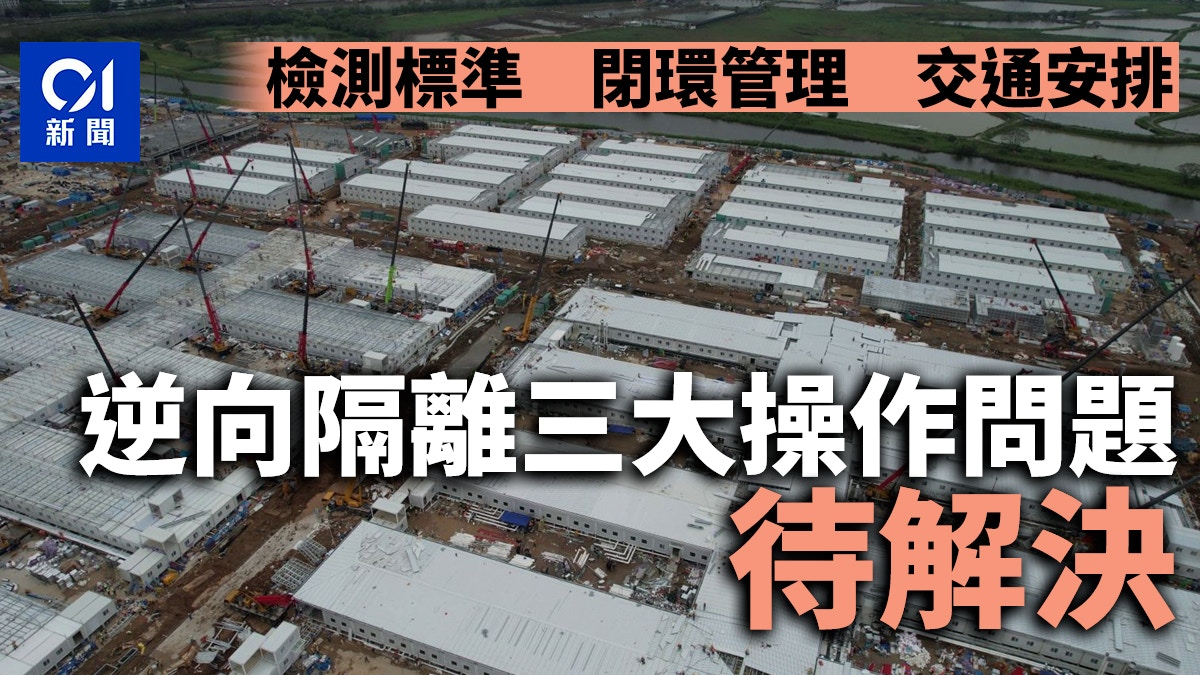Since the outbreak of the new crown epidemic for more than two years, the quarantine-free customs clearance between Hong Kong and the mainland has been a long way off. Even if Hong Kong residents in the north are willing to accept the strict quarantine measures in the mainland, the quota is still too many.
Chief Executive Li Jiachao proposed to the Guangdong leaders yesterday (1st) that "reverse isolation" suggested that people from the north to the mainland can be isolated in the square cabins in the Hetao area of Hong Kong to alleviate the current plight of the shortage of "health station" places. The group's follow-up and implementation is undoubtedly a breakthrough.
From a practical point of view, there are at least three issues to be resolved in "reverse isolation", including testing standards and how personnel from the two places can participate in closed-loop management.
There are often long queues at the Shenzhen Bay Port.
(file picture)
Mainland CT value requirements are high
The first is the testing standard "look at all". Li Jiachao said yesterday that the special classes in the two places will discuss the various standards of "reverse isolation".
At present, the testing standards in Hong Kong and the mainland are not the same. The main issue is where is the boundary of a positive nucleic acid test.
According to the mainland standard, the CT value must reach 40 to be considered negative. In the past, some Hong Kong people who had been infected with the epidemic only found that the CT value did not meet the high standard of the mainland after passing the customs test, so they had to stay in the hospital for many days before being discharged.
DAB Legislative Council member Chen Heng-pin believes that it is not difficult to follow the mainland standards, because the mainland's standards are also adopted when going to the mainland's "health stations", and it is reasonable for the "reverse isolation" to be in line with the mainland's standards, and there are no additional requirements.
However, some politicians believe that there should be uniform regulations on the CT value of the recovered patients. For example, if the CT value exceeds 35, they can be released, so as to avoid staying in Hong Kong because the CT value has not been up to the standard.
Li Jiachao mentioned yesterday that those who have completed the "reverse isolation" do not need to undergo 7+3 isolation in the mainland anymore. Home monitoring is still required, which is the same as the current regulations, "no increase to new".
Chief Executive Lee Ka-chao and Chief Secretary for Administration Chan Kwok-kee met with reporters yesterday to explain the cooperation between Guangdong and Hong Kong.
(Photo by Zheng Zifeng)
Closed-loop management challenges Tang Jiahua: emergency law still in effect
Secondly, "reverse isolation" requires strict closed-loop management. How does it actually work?
Will mainland health authorities join the control?
Chen Hengbin pointed out that based on the current experience of the Penny's Bay Isolation and Quarantine Center, there are not many staff, and there is also experience in cooperating with medical care and testing personnel from the two places. The two places can strengthen cooperation to "fill up" each other.
He believes that what needs to be considered is the number of care and management personnel. He proposed yesterday to refer to the mainland health station, the staff must accept a closed loop, and the mainland health and health commission can send personnel to supervise and manage.
Tian Beichen, a member of the Legislative Council of the Roundtable on Actual Politics, also pointed out a few days ago that "reverse isolation" must be done without leakage, so as not to affect the epidemic situation in the mainland.
In the early stage of the fifth wave of the outbreak, Hong Kong's medical staff was insufficient. The Executive Council, by citing the Emergency Law, empowered the Chief Secretary for Administration to grant exemptions from registration for medical care and treatment of patients. If mainland personnel participate in Hong Kong's "reverse isolation" arrangement this time, Is it legally feasible?
Guild member and senior counsel Tang Jiahua said that according to his understanding, in February this year, the government used an emergency ordinance to exempt mainland medical staff from coming to Hong Kong for registration, and the ordinance is still in effect. proceed without making a new case.
Members of the public are concerned about the process of going to the north
Third, many citizens are concerned about the procedures and transportation arrangements for going north, especially the Hetao District is far from the urban area and it is difficult to reach it directly.
Chen Hengpin believes that the transportation facilities and customs clearance procedures can be integrated together. He pointed out that the current tourist bus "doesn't work", the Hong Kong government can set up pick-up stations at designated locations in Hong Kong, allowing citizens to get on the bus directly to the "reverse isolation" center in the Loop.
Since customs officers need to set up equipment, they can designate a location outside the "reverse isolation" center or park a mobile vehicle to go through customs clearance procedures for citizens.
Chan Heng-pung pointed out that this arrangement will allow customs officers to eliminate the need for closed-loop management and reduce the pressure on relevant manpower.
Customs clearance | Li Jiachao: Guangdong and Shenzhen support "reverse isolation" and set up a special class to discuss reverse isolation in the Hetao District as a pilot project | Attention to those who go north!
How many places are expected to be "reverse isolation"?
Closed loop?
Customs clearance|Liang Xi advocates the "reverse isolation" of the Hetao District, Tian Beichen: Hong Kong must cede power to the mainland in order to succeed

